|
|
|
Sort Order |
|
|
|
Items / Page
|
|
|
|
|
|
|
| Srl | Item |
| 1 |
ID:
189745


|
|
|
|
|
| Summary/Abstract |
East Asia is essential to the UK’s post-Brexit international strategy. Within a complex web of bilateral and multilateral arrangements, the UK needs to manage historical ties, new strategic objectives and ongoing partnerships. Underpinning these interactions is trust and some of the dynamics more commonly associated with formal security alliances. Post-Brexit, there is a need to assure these states of the UK’s place in the world and particularly its commitment to, and strategic objectives in, the region, but also recognise that there is an increasing risk of moral hazard for the UK in seeking to achieve some of its objectives. Catherine Jones offers a framework for understanding the challenges and opportunities for the UK’s current planning in the region.
|
|
|
|
|
|
|
|
|
|
|
|
|
|
|
|
| 2 |
ID:
174073
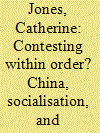

|
|
|
|
|
| Summary/Abstract |
Debates on China’s engagement with international institutions centre on a (false) dichotomy that China is either a status-quo or revisionist power. Both sides of this debate have ample empirical evidence to support their arguments and they tend towards conclusions that China’s behaviour and preferences lie in the space in between these two positions. It is important to consider how China presents a contest to international order from with international institutions.
|
|
|
|
|
|
|
|
|
|
|
|
|
|
|
|
| 3 |
ID:
176223
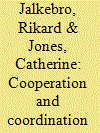

|
|
|
|
|
| Summary/Abstract |
East Asia (here consisting of China, Japan, North and South Korea, and the ten states of the ASEAN) is increasingly being considered as a region which is a potential crucible for conflict. Even the most optimistic authors recognise that there is the potential for security tensions to develop into more comprehensive kinetic actions. In the context of the growing trade tensions between China and the United States, which is drawing in other regional actors, the potential for economic interdependence to mitigate these tensions is reducing. Despite the context in this region we do, however, see evidence of cooperation and coordination emerging within the arena of (so-called) non-traditional security challenges. These papers explore different aspects of the cooperation that we see, and collectively they present the conditions under which there are positive cooperation outcomes in the areas of humanitarian assistance (HA) and disaster relief (DR) and/or peacekeeping operations (PKO). Collectively, they identify that mid-range theories have great explanatory power in exploring and researching this region.
|
|
|
|
|
|
|
|
|
|
|
|
|
|
|
|
| 4 |
ID:
152530
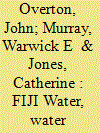

|
|
|
|
|
| Summary/Abstract |
Over recent decades, the demand for bottled water has grown exponentially at the global scale. In the marketing of such products, discourses of purity and paradise have often been invoked. Marketed as a ‘Taste of Paradise’, FIJI Water has gained enormous international success as an ostensibly clean and green product. Celebrity endorsements – reaching as high as US President Barack Obama – have abounded, driven in part by the belief that the corporation is both environmentally and socially responsible. This paper describes and analyses the rise of FIJI water and critically assesses the sources and impacts of its economic success. It goes on to explore its local social and environmental impacts in the context of a country that has been subject to waves of democratic crises where the fate of the polity has been influenced by FIJI Water's actions. FIJI Water has come to assume the role of development trustee in the villages most affected by the growth in exports. The democratic crises in Fiji has given FIJI Water profound developmental influence, and this has brought both costs and benefits at the local socio-environmental scale.
|
|
|
|
|
|
|
|
|
|
|
|
|
|
|
|
| 5 |
ID:
137214
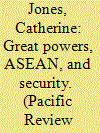

|
|
|
|
|
| Summary/Abstract |
The positive role that external powers can play in the creation and maintenance of security in regions has long been ignored; external interference is generally perceived as detrimental to the ability of a group of states to function as a community. However, this paper argues that in the case of ASEAN, the presence of external actors allows the group to function as a community that also provides and ensures security. This paper furthers the debate regarding ASEAN's security functions. With international attention focused on the Asia-Pacific, there is a need to understand the context in which security is maintained in Southeast Asia.
|
|
|
|
|
|
|
|
|
|
|
|
|
|
|
|
| 6 |
ID:
176228
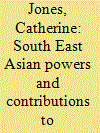

|
|
|
|
|
| Summary/Abstract |
Regions are becoming increasingly central to both the implementation and claims to legitimacy of UN peacekeeping operations. In 2008, in the UN Secretary General published a report on the relationship between the UN and Regional Organisations (S/2008/186**), highlighting that UN-regional partnerships should develop to entail wider capacity building activities, define and refine the responsibilities of regions and the UN in both Chapter VIII and non-chapter VIII activities, and perform functions in support of disarmament and mediation. However, ten years after the UN Secretary General’s report and four years after the HIPPO report there is still an urgent need to understand how, and in response to what drivers, are UN peacekeeping operations changing? In this paper I argue that because of the UN’s approach to partnerships it excludes learning from the contributions of other global potential partners including ASEAN. As a result, although there are pathways that make it possible for such a transfer of knowledge and experience, but these are often blocked—or perhaps just obscured—by the practices within the UN; for example, the institutional stickiness around partnerships.
|
|
|
|
|
|
|
|
|
|
|
|
|
|
|
|
|
|
|
|
|